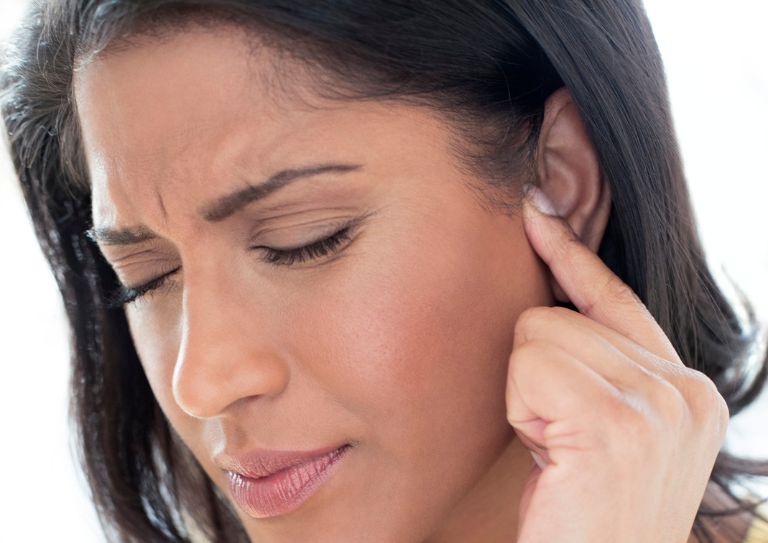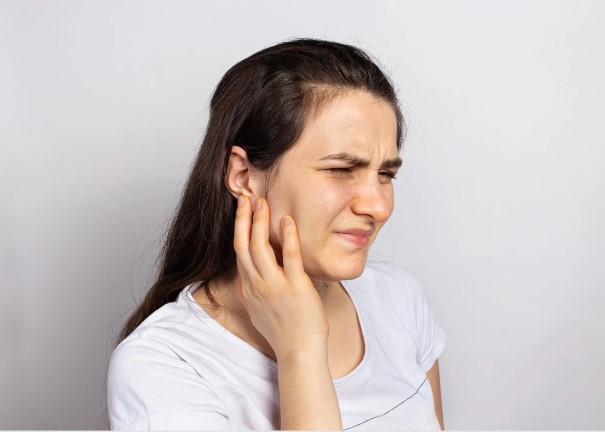Have you ever experienced a constant ringing or buzzing in your ears that no one else seems to hear? This phenomenon is known as tinnitus, and it is like having an unwelcome musical guest playing in your head. But why does it happen?
Tinnitus is more than just a strange noise; it is a puzzling condition that can significantly affect your daily life. Imagine trying to focus on work or enjoy a peaceful night’s sleep while a persistent phantom orchestra plays in your ears. It is bewildering, and for many, it remains a mystery.
Have you visited your doctor for help with the pain and ringing, but still can’t find a solution? What if we told you that the key to understanding and possibly finding relief from tinnitus might be in an unexpected place—your jaw?
The Link Between TMJ and Tinnitus
Anatomical Connection
To understand the link between TMJ and tinnitus, we need to look at the connection between the temporomandibular joint (TMJ) and the ear. The TMJ is the joint that allows you to open and close your mouth, and it is located right in front of your ears. TMJ and the ear are incredibly close neighbours, and they share some important anatomy.
When you open your mouth, the TMJ moves and its movement is intricately linked to the structures of the ear. Specifically, the TMJ shares ligaments, nerves, and blood vessels with the middle ear. This close proximity means that any issues with the TMJ can potentially affect the ear.
TMJ Disorders and Tinnitus
Now, let’s explore how TMJ disorders can lead to tinnitus. TMJ disorders encompass a range of conditions that affect the proper functioning of the TMJ, such as inflammation, misalignment, or damage.
When the TMJ isn’t functioning as it should, it can put pressure on the surrounding structures, including the nerves and blood vessels that connect to the ear. This pressure can disrupt the delicate balance within the ear, leading to abnormal signals being sent to the brain. These irregular signals are often perceived as the phantom sounds of tinnitus.

Scientific Evidence Linking TMJ and Tinnitus
Numerous studies have investigated the connection between TMJ and tinnitus and found that individuals with TMJ disorders are more likely to experience tinnitus.
A 2018 systematic review and meta-analysis of multiple studies found that the prevalence of tinnitus was higher in people with TMJ disorders than in people without TMJ disorders.
Symptoms of TMJ-Related Tinnitus:
TMJ-related tinnitus often comes with a set of distinctive symptoms that can be both unsettling and uncomfortable. These symptoms may include:
Ringing or Buzzing Sounds: Just like regular tinnitus, TMJ-related tinnitus can manifest as persistent ringing, buzzing, or other unusual sounds in one or both ears.
Ear Discomfort: People with TMJ-related tinnitus may experience ear discomfort, pain, or a feeling of fullness in the ears.
Jaw Pain: TMJ disorders can lead to jaw pain, which is often closely connected to the onset of tinnitus. This pain can be experienced during chewing or speaking.
Facial Pain: Some individuals may also experience facial pain or discomfort, especially around the jawline and temples.
Clicking or Popping Sounds: Clicking or popping sounds when opening and closing the mouth are common TMJ-related symptoms, and they can contribute to the development of tinnitus.

Early Intervention and Specialised Care for TMJ and Tinnitus
Early intervention is crucial when dealing with TMJ-related tinnitus for several reasons:
Preventing Progression: TMJ disorders and tinnitus can worsen if left untreated. Seeking help early can prevent the conditions from progressing to more severe stages.
Enhancing Quality of Life: Tinnitus can significantly impact your quality of life, affecting sleep, concentration, and overall well-being. Early treatment can mitigate these effects, improving your daily life.
Tailored Treatment: Specialised care from healthcare providers with expertise in TMJ and tinnitus ensures you receive personalised and effective treatment options. They can develop a plan that addresses your specific needs.
Avoiding Complications: TMJ disorders can lead to complications like chronic pain and difficulty in jaw function. Addressing these issues promptly can help you avoid long-term complications.
If you are experiencing tinnitus or a persistent ringing in your ears, it could be a sign of Temporomandibular Disorder (TMD). At DP Dental, we prioritise a comprehensive assessment of your dental health, posture, and sleep patterns to effectively address the root causes of TMD.
Dr Yue Weng Cheu brings over four years of specialised training from the USA in TMD and has been actively sharing his expertise with dentists worldwide. Through modern, evidence-based methods, Dr. Yue has achieved successful outcomes in treating various cases of TMD and teeth misalignment, all without the need for extractions.
If you have any concerns, please don’t hesitate to reach out to us at +65 6282 0122 to arrange a brief consultation with Dr. Yue or visit our website at https://www.dpdental.com/tmj-disorder-treatment-singapore/ to schedule an appointment. Your well-being is our priority, and we’re here to help you find relief from TMD-related issues.




